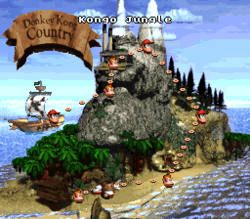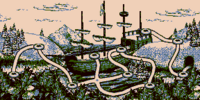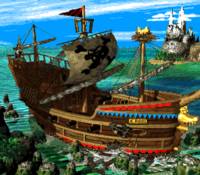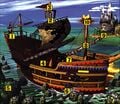Gangplank Galleon: Difference between revisions
Waluigi Time (talk | contribs) (→Theme) |
No edit summary Tags: Mobile edit Advanced mobile edit |
||
| Line 1: | Line 1: | ||
{{distinguish|Gangplank Galley}} | |||
{{about|the ship owned by [[King K. Rool]]|other uses|[[Gangplank Galleon (disambiguation)]]}} | {{about|the ship owned by [[King K. Rool]]|other uses|[[Gangplank Galleon (disambiguation)]]}} | ||
{{location infobox | {{location infobox | ||
| Line 9: | Line 10: | ||
|inhabitants= | |inhabitants= | ||
}} | }} | ||
'''Gangplank Galleon''' (also spelled '''Gang Plank Galleon'''<ref>{{cite|title=''Donkey Kong Land'', ''Nintendo Magazine System'' (UK) WORLD EXCLUSIVE Review booklet|page=10|language=en-gb}}</ref> or '''Gang-Plank Galleon''') is the name of [[King K. Rool]]'s signature ship. It acted as the setting of several levels throughout the ''[[Donkey Kong Country (series)|Donkey Kong Country]]'' and ''[[Donkey Kong Land (series)|Donkey Kong Land]]'' games, first appearing as the location of the final boss fight in the original ''[[Donkey Kong Country]]''. ''Donkey Kong Country'' is the only game where the ship is seen in use, while later games depict it as stationary or dilapidated. Given its sails and rigging, the Gangplank Galleon is mostly based on classic depictions of pirate vessels, although it went under slight design changes with each game. | '''Gangplank Galleon''' (also spelled '''Gang Plank Galleon'''<ref>{{cite|title=''Donkey Kong Land'', ''Nintendo Magazine System'' (UK) WORLD EXCLUSIVE Review booklet|page=10|language=en-gb}}</ref> or '''Gang-Plank Galleon''') is the name of [[King K. Rool]]'s signature ship. It acted as the setting of several levels throughout the ''[[Donkey Kong Country (series)|Donkey Kong Country]]'' and ''[[Donkey Kong Land (series)|Donkey Kong Land]]'' games, first appearing as the location of the final boss fight in the original ''[[Donkey Kong Country]]''. ''Donkey Kong Country'' is the only game where the ship is seen in use, while later games depict it as stationary or dilapidated. Given its sails and rigging, the Gangplank Galleon is mostly based on classic depictions of pirate vessels, although it went under slight design changes with each game. | ||
==History== | ==History== | ||
Revision as of 09:20, January 1, 2025
- Not to be confused with Gangplank Galley.
- This article is about the ship owned by King K. Rool. For other uses, see Gangplank Galleon (disambiguation).
| Gangplank Galleon | |
|---|---|
Donkey Kong Country (Game Boy Advance) world map sprite of Gang-Plank Galleon | |
| First appearance | Donkey Kong Country (1994) |
| Latest appearance | Donkey Kong Country 2 (Game Boy Advance) (2004) |
| Greater location | Donkey Kong Island (Donkey Kong Country, temporarily) Crocodile Isle (Donkey Kong Country 2, Donkey Kong Land 2) |
| Owner | King K. Rool |
Gangplank Galleon (also spelled Gang Plank Galleon[1] or Gang-Plank Galleon) is the name of King K. Rool's signature ship. It acted as the setting of several levels throughout the Donkey Kong Country and Donkey Kong Land games, first appearing as the location of the final boss fight in the original Donkey Kong Country. Donkey Kong Country is the only game where the ship is seen in use, while later games depict it as stationary or dilapidated. Given its sails and rigging, the Gangplank Galleon is mostly based on classic depictions of pirate vessels, although it went under slight design changes with each game.
History
Donkey Kong Country
In Donkey Kong Country, the Gang-Plank Galleon is visible on the overworld map, where it draws closer to Donkey Kong Island with each area that is completed. It hosts the final boss battle in the game, accessed after completing the Chimp Caverns. Going onboard, there are several empty banana peels lying around, suggesting King K. Rool and the Kremlings had already eaten some of the banana hoard; Donkey Kong and Diddy Kong encounter and fight K. Rool, who is eventually defeated and Donkey Kong's banana hoard is returned.
Donkey Kong Land
In Donkey Kong Country's Game Boy counterpart, Donkey Kong Land, the galleon is part of the starting area called Gangplank Galleon Ahoy!. It is docked on the coast of Donkey Kong Island. Donkey Kong and Diddy Kong must travel on the ship itself, but also on the surrounding grounds. Instead of King K. Rool, a large ray named Wild Sting is the boss of the Gangplank Galleon.
Donkey Kong Country 2: Diddy's Kong Quest / Donkey Kong Land 2
In Donkey Kong Country 2: Diddy's Kong Quest and Donkey Kong Land 2, the Gangplank Galleon is the first world that Diddy and Dixie Kong traverse before they venture into the mainland Crocodile Isle in order to rescue Donkey Kong, imprisoned by Kaptain K. Rool. The vessel has become beached on the island's rocky shore and appears to be in medium disrepair. Diddy and Dixie have to venture through the ship's remains to reach the area's guardian, Krow, who resides in the crow's nest. After defeating the giant bird, the Kongs advance to the nearby Crocodile Cauldron. Two sunken pirate ships similar to the Gangplank Galleon appear in Crocodile Cauldron and Krem Quay. At the end of Donkey Kong Country 2, the Gangplank Galleon sinks to the bottom of the ocean, along with the rest of Crocodile Isle.
Other appearances
In Donkey Kong 64, in the Gloomy Galleon's water cove, what is believed to be the remains of the Galleon lies on the seabed ripped in half. Despite all the decay and seaweed, Kaptain K. Rool's portraits and log book, as with the ship itself, remained in perfect condition.[2]
Though the Gangplank Galleon was never named as such, it did appear on the Donkey Kong Country television series. Here, the ship was owned by the dreaded pirate Kaptain Skurvy instead of King K. Rool. On the show the ship often met with disaster, such as being eaten by Jr. Klap Trap in the episode "Booty and the Beast" and accidentally being blown up by Klump in the Christmas-based episode "The Kongo Bongo Festival of Lights".
The Gangplank Galleon, though only referred to as "King K. Rool's ship", also appeared in the Club Nintendo comic "Donkey Kong Country". Like in the game of the same name, it served as the location for the fight between the Kongs and K. Rool. Besides the latter, several other Kremlings can be seen on the ship.
An arrangement of Gang-Plank Galleon is part of the soundtrack in Super Smash Bros. Brawl. It can be heard at Rumble Falls and one of the stages of The Subspace Emissary. The arrangement reappears in Super Smash Bros. for Wii U on the Kongo Jungle stage. For Super Smash Bros. Ultimate, a new arrangement by ACE accompanies the reveal trailer for King K. Rool as a new playable fighter.
General information
Physical features
In Donkey Kong Country, the Gang-Plank Galleon, as it is shown on the map, contains a single mast, although the Game Boy Advance port depicts the ship more realistically with two additional masts. A black flag rises at the top of the main mast, just above a crow's nest. Kremling-specific elements of the ship include the Kremling Krew's emblem on the mast (a Kremling Jolly Roger) and the figurehead on the prow. It also hosts five cannons on one side.
In Donkey Kong Land, Gangplank Galleon has several notable changes compared to its appearance in Donkey Kong Country. It now features a frontal and rear mast, and the main mast now lacks the Kremling Krew's emblem. Instead, several sail spars are joined to all of the masts. The crow's nest has been moved on the back mast, and the upper deck has been lowered to be level with the main deck.
Donkey Kong Country 2 and Donkey Kong Land 2 yet again corrected the ship to bear the designs from both Donkey Kong Country and Donkey Kong Land. The sail with the Kremling Krew's emblem is seen covering the main mast again, accompanied by two other masts. There is a golden figurehead of K. Rool under the bowsprit. A red flag is flown at the top of the main mast, replacing the black flag from the original game; the number of cannons from the wall has been reduced from five to three.
Profiles
Donkey Kong Land
- Instruction booklet description:
- English:
King K. Rool's leaky old ship is crewed by his kooky Kremling accomplices.[3]
- English:
- Nintendo Power Volume 74: King K. Rool's ship has dropped anchor near Donkey Kong's treehouse. Journey through the jungle and mountain highlands on your way to the gruesome galleon. The following pages examine the treacherous terrain in fine detail.[4]
- Nintendo Magazine System booklet: K. Rool didn't suspect a thing - not a banana - as DK and Diddy hitched a ride on his Galleon, thus leading them to his secret hideout. On this first stage of their voyage the Kong brothers soon discover that all is not so familiar. Don't forget, this is Kremling territory now, where artic conditions rest comfortably alongsode humid jungle. Most disturbing of all though is that here pigs really can fly![citation needed]
Donkey Kong Country 2: Diddy's Kong Quest
- Instruction booklet description:
- English:
Diddy's first action takes place aboard K. Rool's scuttled flagship, Gangplank Galleon. Even though this hulk isn't seaworthy, it's still manned by a scurvy Kremling crew. You'll find lots of hooks and rigging to climb on here. You can also duck into the flooded cargo hold for more fun![5]
- English:
- Player's Guide: Ever though it's half-sunken, the once-proud flagship of Kaptain K. Rool's fleet still server as the first line of defense against any Kong rescue party.[6]
- Nintendo Power Volume 79: Ahoy! Kaptain K. Rool's flagship, the Gangplank Galleon, has run aground off the coast of Crocodile Isle (okay, so he's a pirate, not a sailor). Her deck are awash with Kremling cutthroats, but you decide to investigate, just in case. Since this is your first time doing the hero thing, you might need some help finding your way. Donkey Kong managed to leave a trail of bananas as he was dragged off, so if you ever get turned around, follow the yellow fruit to the end of the stage. Aye! Ahrr![7]
Donkey Kong Land 2
- Nintendo Power Volume 87: Avast! Kremling cutthroats are everywhere, ready to swab the deck with any monkey foolish enough to swing aboard.[8]
Gallery
Donkey Kong Country (Game Boy Color)
Donkey Kong Country 2 (Game Boy Advance)
Theme
- Main article: Gang-Plank Galleon (theme)
The Gangplank Galleon's theme, "Gang-Plank Galleon," appears to be loosely based on the title theme for the 1991 NES port of Sid Meier's Pirates!, also developed by Rare.
| File info |
| File info |
| File info |
| File info |
Names in other languages
| Language | Name | Meaning | Notes |
|---|---|---|---|
| Japanese | キングクルールのふね[?] Kingu Kurūru no fune |
King K. Rool's Ship | |
| French | Gallion de la Galère[?] | Galley Galleon | |
| Italian | Galeone Birbone (Donkey Kong Country)[?] | Rascal Galleon | |
| Galeone (Donkey Kong Land)[?] | Galleon | ||
| Plancia del Galeone (Donkey Kong Country 2: Diddy's Kong Quest)[?] | Gangplank Galleon | ||
| Portuguese | Galeão Gang-Plank[?] | Gang-Plank Galleon | |
| Spanish | Galeón de Gangplank[?] | Gangplank's Galleon |
References
- ^ Donkey Kong Land, Nintendo Magazine System (UK) WORLD EXCLUSIVE Review booklet. Page 10.
- ^ "GLOOMY GALLEON You've gotta fight your way through King K. Rool's fleet of wrecked ships." – November 1999. Nintendo Official Magazine Vol. 86. Page 14.
- ^ 1995. Donkey Kong Country 2: Diddy's Kong Quest instruction booklet. Nintendo of America (American English). Page 15.
- ^ July 1995. Nintendo Power Volume 74. Nintendo of America (American English).
- ^ 1995. Donkey Kong Country 2: Diddy's Kong Quest instruction booklet. Nintendo of America (American English). Page 20.
- ^ Miller, Kent and Paul Shinoda (1995). Donkey Kong Country 2: Diddy's Kong Quest Nintendo Player's Guide. Nintendo of America (American English). Page 20.
- ^ December 1995. Nintendo Power Volume 79. Nintendo of America (American English). Page 18.
- ^ August 1996. Nintendo Power Volume 87. Nintendo of America (American English). Page 43.












